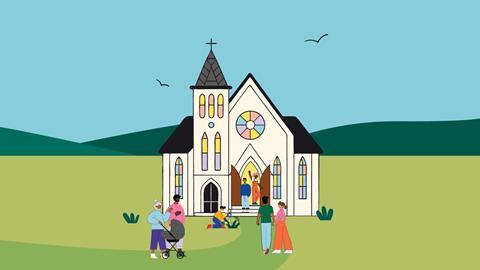A very British revival has arrived, according to new research from Bible Society. It’s an exciting time to be a Christian in the UK, says Chine McDonald

I thought revival would look a little different.
Church services full to bursting, people being slain in the Spirit in queues at the supermarket, and others knocking on their Christian neighbours’ doors asking how they can be saved.
We have of course seen glimmers of these types of mass revivals in the UK in my lifetime. Like the Cwmbran outpouring in Wales in 2013, when revival meetings were put on every night because demand was so great, after reports of healings and hundreds of people becoming Christians. Thousands of people from all over the world had visited the church at the centre of the revival – Victory Church to see for themselves.
But the shift in the spiritual atmosphere described in Bible Society’s new research suggests a quieter revival; a very British one – not showy, not loud, but steady and understated. The findings conducted by YouGov are significant, however. It suggests that the decline in church attendance in England and Wales has now stopped – there were around two million more people attending church in 2024 than there had been in 2018.
This is a quieter revival; a very British one – not showy, not loud, but steady and understated
The Church is now in a period of growth, with Gen Z leading the charge. The report – titled The Quiet Revival - shows that the most dramatic church growth is among young adults, particularly young men. In 2018, around four per cent of 18-24 year-olds said that they attended church at least monthly. Now this has gone up to 16 per cent, with young men increasing from four per cent to 21 per cent, and young women from 3 to 12 per cent.
They say that change happens slowly then all at once; and this feels to me to ring true when it comes to the seeming ‘vibe shift’ in perceptions and positivity about Christianity in our culture. Before the pandemic, we heard a lot about declining church attendance, then Covid-19 seemed to be the death-knell as congregations dwindled even further. Then after the pandemic recovery came the 2021 Census figures, which showed that the number of those that ticked the Christian box was at its lowest level.
But something seems to have shifted over the past two years, in particular. We hear of young people queuing to enter Catholic mass, we hear of teenagers turning up to church unannounced, then dragging their parents along, we hear of Bible sales going up, we hear of online meetings run by the Orthodox Church being attended by hundreds, we hear of university mission organisations seeing sparks in interest among students. A drip-drip of change.
The numbers reported in The Quiet Revival will not necessarily look like people queuing round the corner to get into local churches; but they may look a little like many churches having a few more congregants. I’ve noticed this in my own church when on Sunday mornings in recent months, I’ve looked around and wondered who these new people are that are joining us, and where they have come from.
Over the past couple of years we at Theos have noticed an openness to Christian ideas in the public square; a place that felt much more hostile to Christianity and religion in general in the early 2000s when atheism was presumed to be the default, and Richard Dawkins and friends were comparing religious belief to the smallpox.
It’s an exciting time to be a Christian in the UK, and the Church needs to be ready to be the community of believers that truly represents the wonder of the kingdom of God people are reading and hearing about in scripture – a wonder and an encounter that compels them to turn up at church one Sunday morning.
Read the full report from Bible Society here





































No comments yet